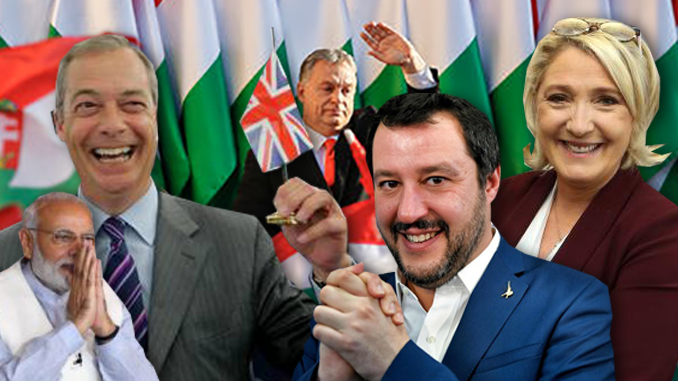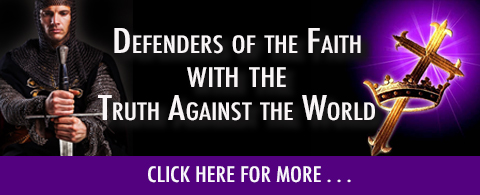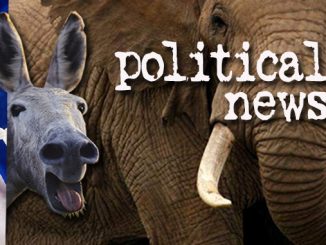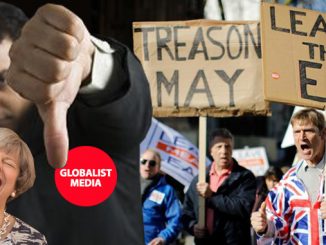
Around the world, the “deplorables” are electing populists to power.
By John Friend
Nationalists and populists the world ‘round made their voices heard loud and clear in recent elections in both Australia and the European Union (EU), riding the wave of populist sentiment and dissatisfaction with liberal elites pushing multiculturalism, open borders, and a radical “green” environmentalist agenda, dissatisfaction that was so well capitalized on by Donald Trump in the 2016 election.
Two weeks ago, Australian Prime Minister Scott Morrison stunned the elite political pundits and talking heads who had predicted his defeat for weeks by winning re-election. Morrison leads a coalition of national parties that maintained support in both the suburbs of Australia’s major metropolitan areas as well as in the countryside. The recently re-elected prime minister has voiced his admiration and support for Trump in the past, and it was clear he tapped into the populist talking points and agenda that helped the celebrity businessman-turned-politician fare so well in the last U.S. presidential election.
“Tonight is about every single Australian who depends on their government to put them first,” Morrison declared at his victory party in Sydney after the election results were in. “And that is exactly what we are going to do.”
During the election campaign, Morrison championed populist economic issues, arguing for economic stability and support for the middle and working classes that have been negatively impacted by the harsh reality of economic globalization, stagnant wages, and an increasing pool of foreign workers, economic migrants, and so-called refugees hoping to find a safe haven in Western countries like Australia. On the campaign trail, Morrison advocated for lowering energy prices and cutting costs for home buyers, among other populist issues.
Morrison thanked “the quiet Australians,” the average, salt-of-the-earth Australian working men and women who supported his political coalition.
“It has been those Australians who have worked hard every day. They have their dreams, they have their aspirations, to get a job, to get an apprenticeship, to start a business, to meet someone amazing,” Morrison noted, “to start a family, to buy a home, to work hard and provide the best you can for your kids, to save for your retirement. These are the quiet Australians who have won a great victory tonight!”
Leading up to the election, political analysts were virtually guaranteeing a left-wing Labor victory, with one commentator boldly declaring that the election was “unlosable” for the Australian Labor Party. The so-called “quiet Australians,” often derided and dismissed by the liberal political and media elites in Australia, threw a major wrench in their election forecasting and caused a devastating blow to the cosmopolitan, globalist liberal elite.
The Labor candidates had run on a platform focusing on climate change and environmental issues, increasing government funding for social services, and ending tax cuts for the wealthy, issues that are increasingly not resonating with working- and middle-class voters who are more concerned with economic stability, jobs, and the negative effects of globalism and open borders.
“The U.S., Britain and Australia—perhaps Canada too—may be in the midst of a populist uprising,” David Winston, a Republican adviser and strategist, recently argued following the election. “Populism usually arrives when governmental leaders are not addressing the agenda the country at large wants.”
Winston continued: “What these countries with different elections and different electoral systems in very different parts of the world all face is a working and middle class that understands the importance of climate change but doesn’t understand elites who consistently make climate change a higher priority than jobs, wages, the cost of living, and health care. What all these voters, who upended the political status quo and defied expectations in recent elections, share is a strong and sincere belief that elites, and only elites, in their societies control their government and its agenda. And they believe these elites neither respect their views nor care about their problems.”
Meanwhile, European nationalists and populists also fared well in the recent European Parliamentary elections, which wrapped up this past weekend. Euroskeptic parties and anti-establishment voices made considerable gains in the EU elections, ensuring a radical shake-up of the ruling governing coalitions in Brussels.
Voter turnout throughout much of Europe was at its highest levels in 20 years, with voters in many major European nations—including Italy, France, Germany, and the United Kingdom— largely rejecting the mainstream political parties that have ruled for so long. The election results made clear that the major political factions to be contended with are now the more anti-EU forces on the right and the environmentalists on the left, as both forces made significant gains while the mainstream center-right parties (EPP) and the Socialists and Democrats (S&D) each lost seats overall.
In France, the political party of current French President Emmanuel Macron, a globalist with close ties to the international community, lost to Marine Le Pen’s more right-wing political faction. In Italy, Deputy Prime Minister Matteo Salvini, a leading populist in European politics and a major critic of mass Third World immigration into Italy and Europe more generally, made significant gains as his League Party won roughly one-third of the country’s vote, ensuring his party will become one of the largest parties and political blocs in the European Parliament. Nigel Farage, whose Brexit Party made significant gains in its first-ever electoral contest, was a big winner in elections held in the UK, demonstrating that the more right-wing, Euroskeptic faction of British politics is still a force to be reckoned with.
Following the elections, Salvini reached out to Le Pen, Farage, and Hungary’s nationalist leader Viktor Orban in an effort to form a coalition of nationalists and populists that could effectively work together to combat the nation-wrecking policies of the globalist forces who have heretofore dominated the EU. Salvini and other European nationalists had campaigned together leading up to the election as well, with a major rally organized by Salvini and attended by Le Pen and other right-wing political leaders in Europe taking place shortly before Europeans went to the polls.
The recent electoral success of populists and nationalists in both the European Union and Australia are a sure sign that voters are increasingly disillusioned with globalism, open borders, and forced multiculturalism so forcefully promoted by the agents of the New World Order.
John Friend is a freelance author based in California.
Nationalists Claim Historic Victories
By Patrick J. Buchanan
Hillary Clinton called them “the deplorables.” Barack Obama called them losers who “cling” to their Bibles, bigotries, and guns. To President Jean-Claude Juncker of the European Commission, they are “these populist, nationalists, stupid nationalists . . . in love with their own countries.” Well, “stupid” they may be, and, yes, they do love their countries, but last week they gave Juncker a thrashing, as they shook up the West and the world. Elections in the world’s largest electoral blocs—the 28-nation EU, and an India of 1.3 billion people—showed that the tide of nationalism continues to rise and spread across Europe and Asia.
In India, the Hindu Nationalist BJP party of Prime Minister Narendra Modi won a smashing victory. So strong was Modi’s showing that he rushed to reassure non-Hindus, especially India’s 200 million Muslims, that they remain equal citizens. But in India the Hindu hour is at hand.
Nigel Farage’s Brexit Party, formed just months ago, ran first in Britain with 31%. No other party came close. Labor won 14% and Prime Minister Theresa May’s Tories ran fifth with 9%, a historic humiliation.
In the French elections, Emmanuel Macron’s party lost to the National Rally of Marine Le Pen, whom he had defeated two to one in the last presidential election.
Matteo Salvini’s populist-nationalist League, with 34%, ran first in Italy in a showing that could lead to national elections that could make him prime minister.
The nationalist Law and Justice Party in Poland and the populist Fidesz Party of Viktor Orban in Hungary were easily victorious.
In Germany, however, the conservative-socialist coalition of Angela Merkel bled support. Both the CDU and SPD lost strength in defeats that could shake the Berlin government.
What do these elections tell us? If the Conservatives wish to remain in power in Parliament, they will have to leave the European Union and, if necessary, crash out without a divorce settlement with Brussels.
The Tories cannot defy the will of their own majority on the most critical issue in 50 years—a nationalist demand to be free of Brussels—and still survive as Britain’s first party.
Whoever wins the Tory competition to succeed May will almost surely become the prime minister who leads Britain out of the EU. Nor is that such a tragedy.
The first Brexit, after all, was in 1776, when the 13 colonies of North America severed all ties to the British crown and set out alone on the path to independence. It did not turn out all that badly.
Last week’s election also saw major gains for the Green parties across Europe. Laser-focused on climate change, these parties will be entering coalitions to provide center-left and center-right regimes the necessary votes to create parliamentary majorities. The environment is now likely to rival Third World immigration as an issue in all elections in Europe.
While nationalist and populists control a fourth of the seats in the EU Parliament, they are isolated. They may have the power to block or veto EU actions by Brussels, but they cannot impose their own agenda.
Yet even larger lessons emerge from these two elections. Liberalism appears to be losing its appeal. A majority in the world’s largest democracy, India, consciously used their democratic right to vote—to advance sectarian and nationalist ends.
Why is liberalism fading away, and nationalism ascendant? The former is an idea that appeals to the intellect; the latter, rooted in love of family, faith, tribe, and nation, is of the heart. In its potency to motivate men, liberalism is to nationalism what near beer is to Bombay gin.
To be a proud Pole, Hungarian, Italian, or Scotsman has a greater grip on men’s love, loyalty, and allegiance than to be a citizen of Europe.
“Whoever speaks of Europe is wrong,” said Bismarck. Europe is but “a geographical expression.”
Identity politics, people identifying themselves by their ethnicity, nationality, race, culture, and faith, appears to be the world’s future.
Even leftists are bowing to the new reality.
“Identity politics is exactly who we are and it’s exactly how we won,” says Stacy Abrams, the African-American Democrat who almost won the Georgia governor’s race. “By centering communities in Georgia, we . . . increased voter participation, we brought new folks to the process.”
The Democratic Party is now a coalition easily identifiable by race, ethnicity, ideology and gender—African-American, Hispanic, Asian, LGBTQ, feminist, and [fanatically] green.
Our Founding Fathers believed we Americans were a new people, a separate, unique, identifiable people, a band of brothers, who had risked their lives and shed their blood. Liberals believe we are held together by abstract ideas and ideals, such as democracy, equality, and diversity. But did Washington, Jefferson, Madison, Monroe, Calhoun, Clay, Jackson, Sam Houston, Tyler, and Polk really believe in equality and diversity as they drove Indians, French, British, Spanish, and Mexicans out of this land to create a continent-wide nation of their own? Or was Manifest Destiny really all about us, and not them?
Pat Buchanan is a writer, political commentator and presidential candidate. He is the author of Nixon’s White House Wars: The Battles That Made and Broke a President and Divided America Forever and previous titles including The Greatest Comeback: How Richard Nixon Rose From Defeat to Create the New Majority, Suicide of a Superpower: Will America Survive to 2025? and Churchill, Hitler and the Unnecessary War, all available from the AFP Online Store.
COPYRIGHT 2019 CREATORS.COM








